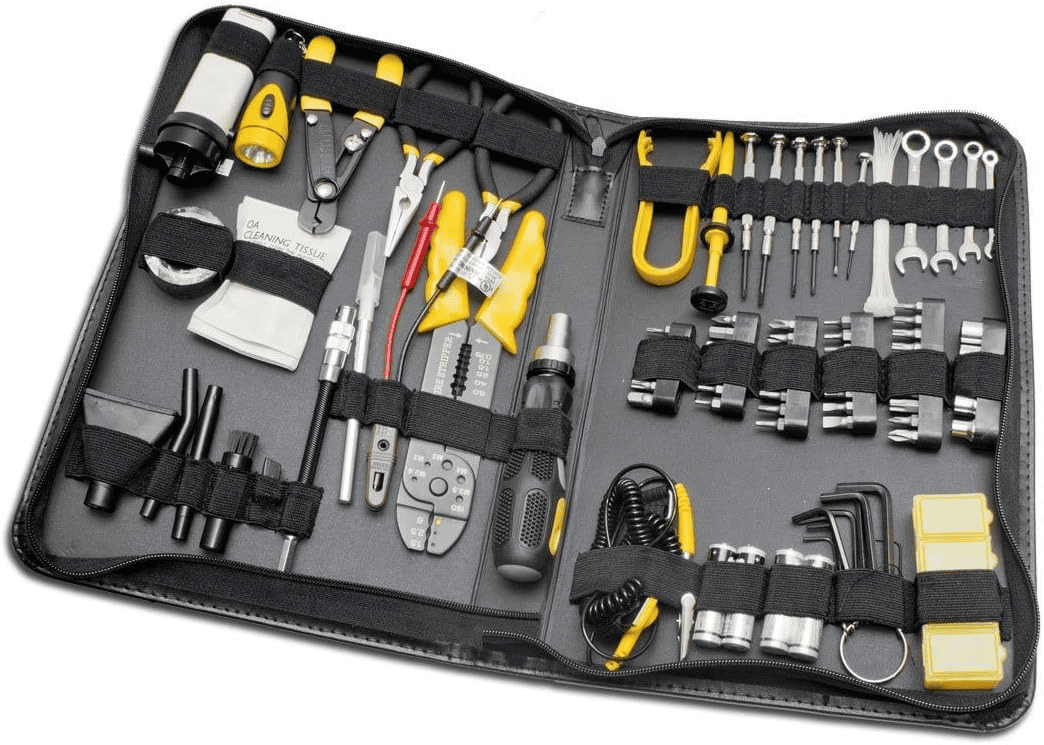Computer repair tools are essential for fixing and maintaining electronic devices. These tools range from basic screwdrivers to specialized kits designed for specific devices. A comprehensive computer repair toolkit typically includes precision screwdrivers, opening tools, tweezers, and an anti-static wristband.
iFixit offers popular repair toolkits for computers, smartphones, and tablets. Their Pro Tech Toolkit contains 64 precision bits, a flexible extension, and various opening tools. This kit is backed by thousands of free repair instructions, making it valuable for both professionals and hobbyists.
Computer repair tools help users save money by performing maintenance and repairs at home. Many common issues can be resolved with the right tools and knowledge. For those interested in learning more about computer repair, online resources and tutorials are readily available.

Essential Tools for the Aspiring Computer Repair Technician
Want to fix computers like a pro? Whether you’re troubleshooting a friend’s laptop or considering a career in IT, having the right tools is essential. Here’s a breakdown of the must-have tools for any aspiring computer repair technician.
1. Screwdrivers
This is a no-brainer. You’ll need a variety of screwdrivers to open computer cases, remove components, and access internal parts. Look for a set that includes both Phillips and flathead screwdrivers in various sizes.
- Precision Screwdriver Set: Essential for working with small screws found in laptops, smartphones, and other electronics.
- Magnetic Screwdriver: A lifesaver for retrieving dropped screws in tight spaces.
2. Anti-Static Tools
Static electricity can damage sensitive computer components. Protect your hardware with these tools:
- Anti-Static Wrist Strap: Worn around your wrist, this strap grounds you and prevents static discharge.
- Anti-Static Mat: Provides a safe surface to place components on while you work.
3. Diagnostic Tools
These tools help you identify problems and troubleshoot issues:
- Bootable USB Drive or CD: Contains diagnostic software or an operating system to help troubleshoot startup problems.
- Multimeter: Measures voltage, current, and resistance, allowing you to test power supplies and other components.
4. Cleaning Tools
Dust and debris can cause overheating and performance issues. Keep your systems clean with these:
- Compressed Air: Used to blow out dust from fans, vents, and other areas.
- Microfiber Cloths: For cleaning screens, cases, and components.
- Isopropyl Alcohol: For cleaning contacts and removing thermal paste.
5. Other Essential Tools
Here are a few more tools that will come in handy:
| Tool | Use |
|---|---|
| Cable Ties | Organize cables and keep your workspace tidy. |
| Flashlight | Illuminate dark areas inside computer cases. |
| Tweezers | Handle small parts and connectors. |
| Pliers | Grip and manipulate components. |
| Thermal Paste | Apply between the CPU and heatsink for optimal heat transfer. |
Building Your Toolkit
You don’t need to buy everything at once. Start with the basics and gradually add more tools as you gain experience and tackle more complex repairs. Remember, quality tools can make a big difference in your work, so invest wisely.
Key Takeaways
- Computer repair toolkits contain specialized tools for fixing electronic devices
- iFixit offers comprehensive kits with free repair instructions
- DIY repairs can save money and extend device lifespan
Essential Computer Repair Tools
Ever wondered what it takes to be a computer repair technician? Beyond the technical know-how, having the right set of tools can make all the difference. From simple screwdrivers to specialized diagnostic equipment, these tools are essential for troubleshooting, repairing, and maintaining computers. Let’s take a look at the must-have tools for anyone looking to fix PCs like a pro.
Computer repair professionals rely on a diverse set of tools to diagnose, fix, and maintain various hardware and software issues. These tools range from physical hardware implements to specialized software applications.
Toolkits and Organizational Aids
A well-organized toolkit forms the backbone of any computer repair operation. The iFixit Pro Tech Toolkit stands out as a popular choice among technicians. It contains a variety of precision screwdrivers, including Phillips, flathead, and Torx bits.
Pliers and tweezers are crucial for handling small components. Spudgers help pry open device casings without causing damage. Zip ties keep cables neat and organized during and after repairs.
Many technicians prefer modular toolkits with removable palettes. These allow for easy customization and transport of tools to different job sites. Some kits include anti-static mats to protect sensitive components from electrostatic discharge.
Testing and Diagnostic Equipment
Accurate diagnosis is key to effective repairs. Multimeters are essential for measuring voltage, current, and resistance in electronic circuits. They help identify faulty components and power issues.
Cable testers verify the integrity of network and power cables. Power supply testers check PSU functionality without risking other components. Memory testers can identify faulty RAM modules.
For data recovery, specialized hardware tools allow technicians to clone drives and retrieve information from failing storage devices. These tools can often salvage data even when a computer won’t boot.
Protection and Maintenance Supplies
Anti-static wrist straps are critical for preventing electrostatic discharge when handling sensitive components like CPUs and RAM. They ground the technician, reducing the risk of accidental damage.
Thermal paste is necessary for proper heat transfer between CPUs and heatsinks. It’s applied when installing new processors or reseating existing ones for better cooling performance.
Compressed air cans help remove dust and debris from computer interiors. Microfiber cloths are useful for cleaning screens and exterior surfaces without scratching.
Specialized Repair Tools
Soldering irons allow technicians to repair or replace small electronic components on motherboards and other circuits. Precision tips are essential for working with tiny surface-mount devices.
Chip extractors and IC pliers help remove and insert chips without bending pins. These tools are particularly useful when working with CPUs or memory modules.
For laptop repairs, spudgers and plastic opening tools are invaluable. They help separate delicate components and casings without causing cosmetic damage.
Software Tools for Repair and Optimization
Diagnostic software helps identify hardware and software issues. Tools like MemTest86 can detect RAM problems, while disk health monitors can predict drive failures.
Driver update utilities ensure that hardware components have the latest software support. This can resolve compatibility issues and improve performance.
System optimization tools like AVG TuneUp can clean up unnecessary files, update software, and improve overall system performance. These applications often include features for managing startup programs and removing bloatware.
Recovery tools allow technicians to rescue data from failing drives or restore systems to previous states. Many manufacturers provide their own recovery software for their specific hardware.







